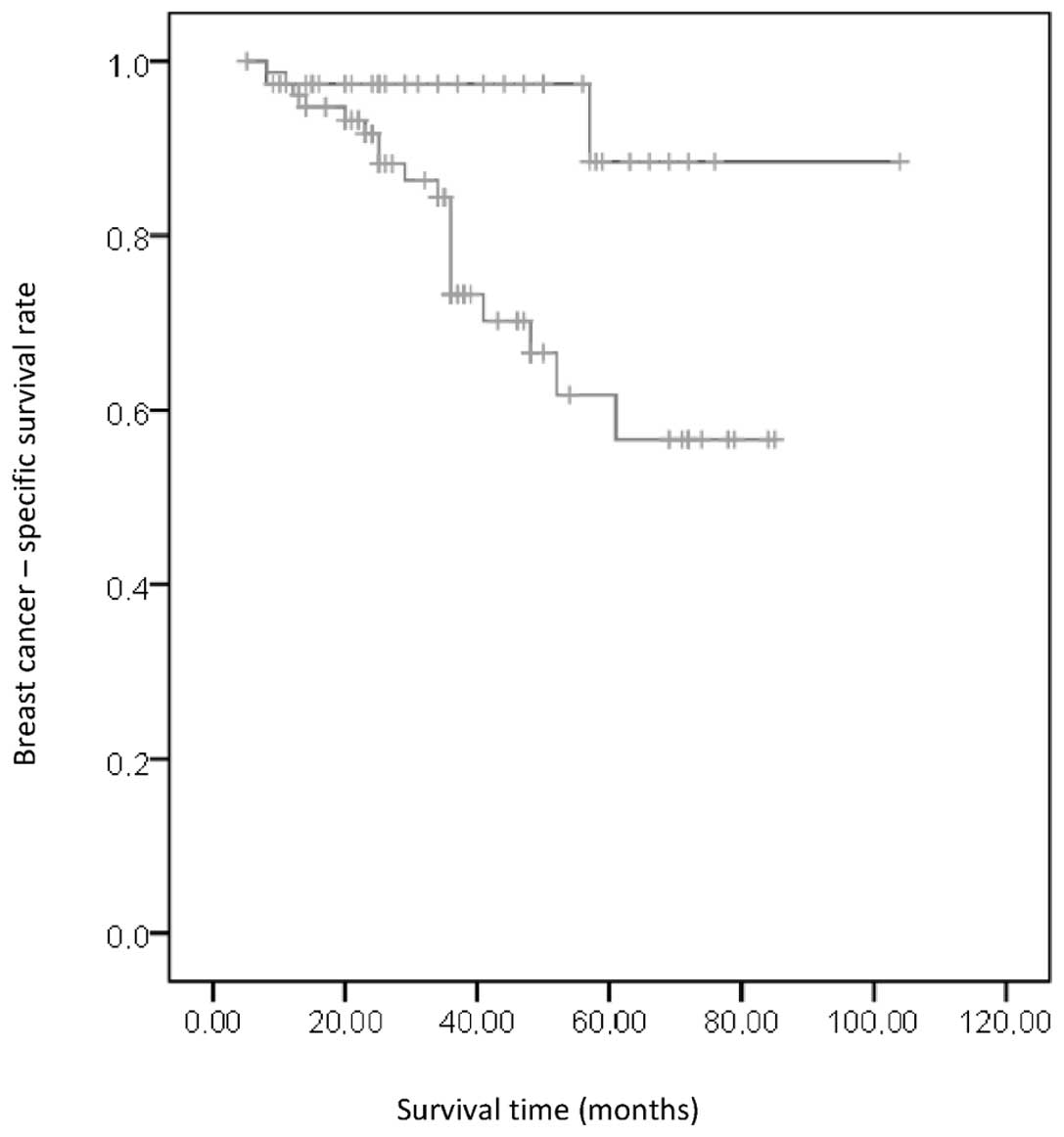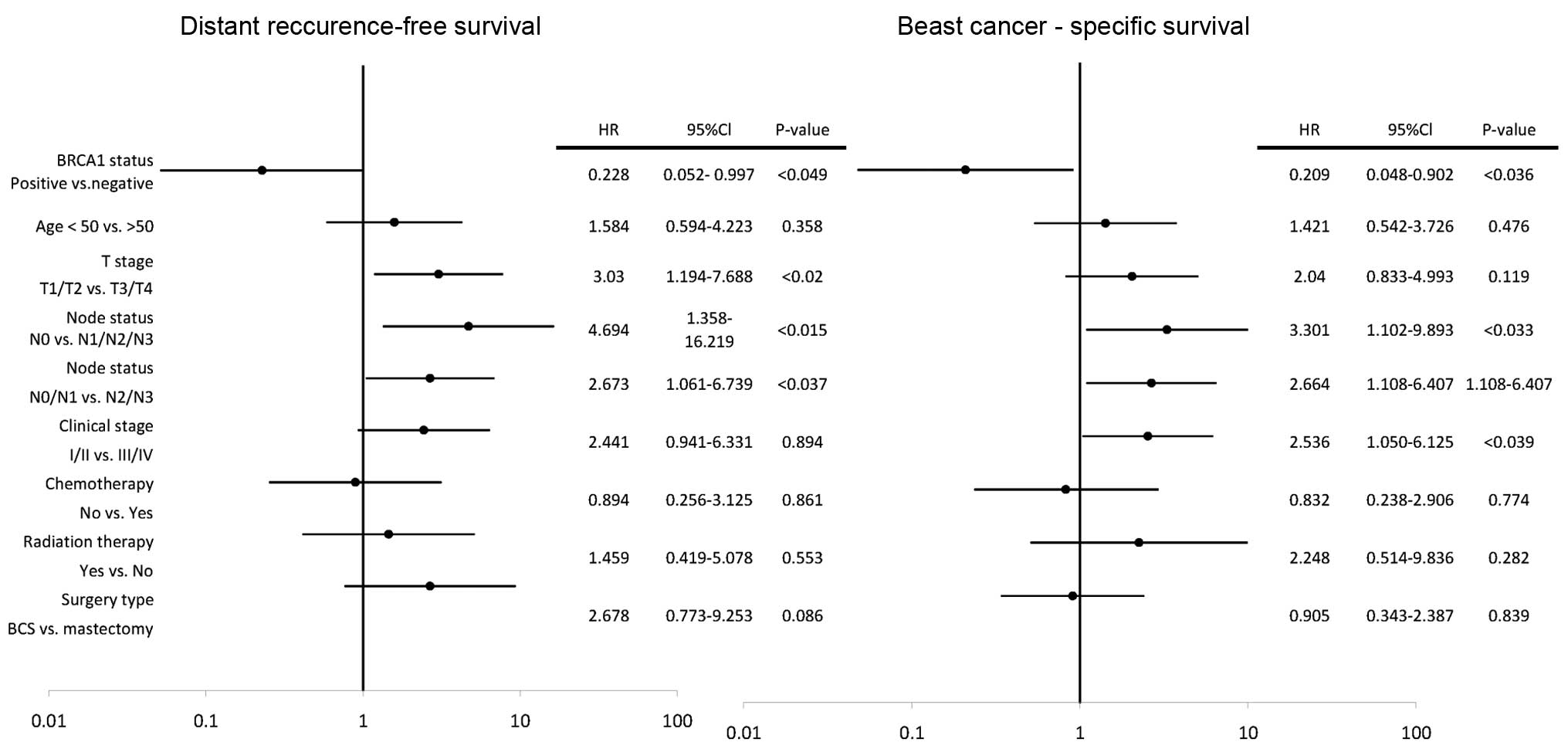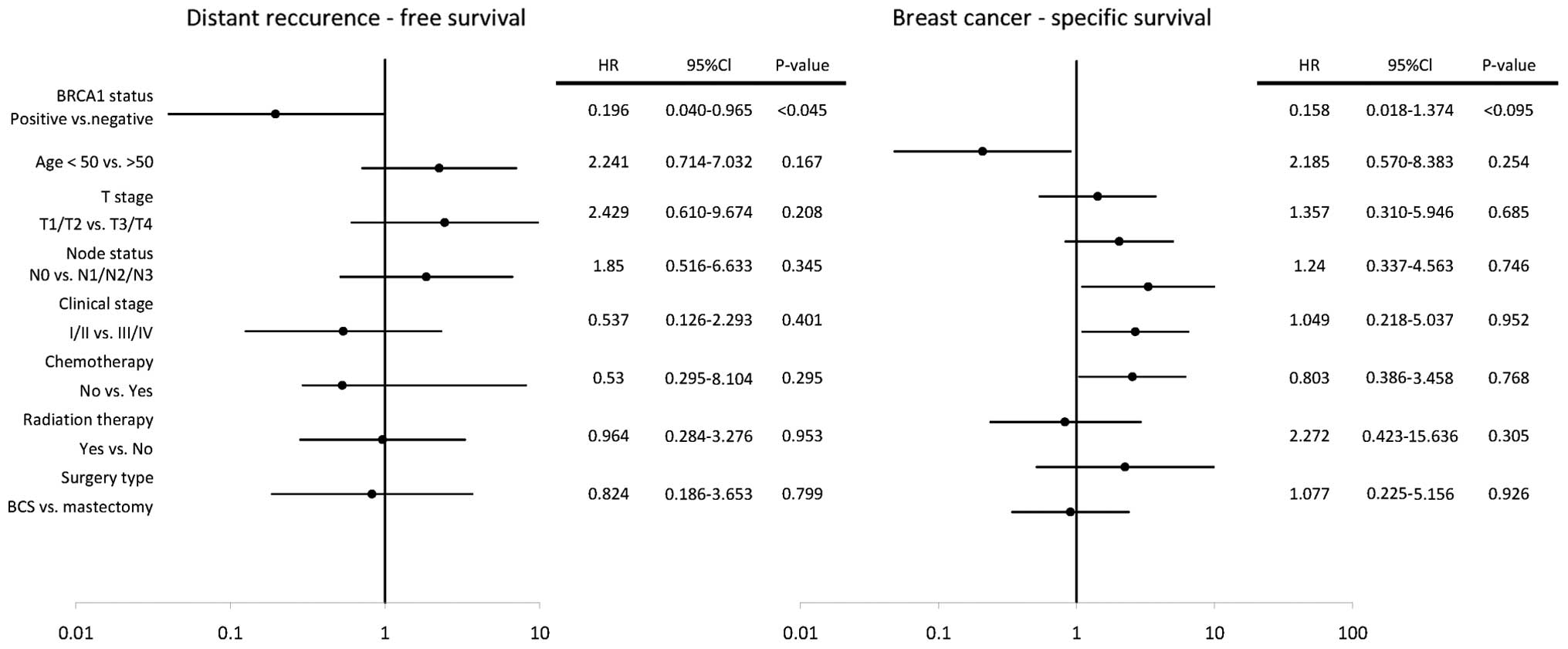|
1
|
Bauer KR, Brown M, Cress RD, et al:
Descriptive analysis of estrogen receptor(ER)-negative,
progesterone receptor (PR)-negative, and HER2-negative invasive
breast cancer, the so-called triple negative phenotype: A
population-based study from the California cancer rRegistry.
Cancer. 109:1721–1728. 2007. View Article : Google Scholar
|
|
2
|
Rakha EA, Elsheikh SE, Aleksandarany MA,
et al: Triple-negative breast cancer: distinguishing between basal
and nonbasal subtypes. Clin Cancer Res. 15:2302–2310. 2009.
View Article : Google Scholar
|
|
3
|
Kaplan HG and Malmgren JA: Impact of
triple negative phenotype on breast cancer prognosis. Breast J.
14:456–463. 2008. View Article : Google Scholar : PubMed/NCBI
|
|
4
|
Carey LA, Dees EC, Sawyer L, et al: The
triple negative paradox: primary tumor chemosensitivity of breast
cancer subtypes. Clin Cancer Res. 13:2329–2334. 2007. View Article : Google Scholar : PubMed/NCBI
|
|
5
|
Atchley DP, Albarracin CT, Lopez A, et al:
Clinical and pathologic characteristics of patients with
BRCA-positive and BRCA-negative breast cancer. J Clin Oncol.
26:4282–4288. 2008. View Article : Google Scholar : PubMed/NCBI
|
|
6
|
Reis-Filho JS and Tutt AN: Triple negative
tumours: a critical review. Histopathology. 52:108–118. 2008.
View Article : Google Scholar
|
|
7
|
Gonzalez-Angulo AM, Timms KM, Liu S, et
al: Incidence and outcome of BRCA mutations in unselected patients
with triple receptor-negative breast cancer. Clin Cancer Res.
17:1082–1089. 2011. View Article : Google Scholar : PubMed/NCBI
|
|
8
|
Hartman AR, Kaldate RR, Sailer LM, et al:
Prevalence of BRCA mutations in an unselected population of
triple-negative breast cancer. Cancer. 118:2787–2789. 2012.
View Article : Google Scholar : PubMed/NCBI
|
|
9
|
Farmer H, McCabe N, Lord CJ, et al:
Targeting the DNA repair defect in BRCA mutant cells as a
therapeutic strategy. Nature. 434:917–921. 2005. View Article : Google Scholar : PubMed/NCBI
|
|
10
|
Silver DP, Richardson AL, Eklund AC, et
al: Efficacy of neoadjuvant Cisplatin in triple-negative breast
cancer. J Clin Oncol. 28:1145–1153. 2010. View Article : Google Scholar : PubMed/NCBI
|
|
11
|
Tutt A, Robson M, Garber JE, et al: Oral
poly(ADP-ribose) polymerase inhibitor olaparib in patients with
BRCA1 or BRCA2 mutations and advanced breast cancer: a
proof-of-concept trial. Lancet. 376:235–244. 2010. View Article : Google Scholar
|
|
12
|
Lee LJ, Alexander B, Schnitt SJ, et al:
Clinical outcome of triple-negative breast cancer in BRCA1
mutation carriers and noncarriers. Cancer. 117:3093–100. 2011.
View Article : Google Scholar : PubMed/NCBI
|
|
13
|
Bayraktar S, Gutierrez-Barrera AM, Liu D,
et al: Outcome of triple-negative breast cancer in patients with
and without deleterious BRCA mutations. Breast Cancer Res Treat.
130:145–153. 2011. View Article : Google Scholar : PubMed/NCBI
|
|
14
|
Plakhins G, Iremjs A, Gardovskis A, et al:
Genotype-phenotype correlations among BRCA1 4153delA and 5382insC
mutation carriers form Latvia. BMC Med Genet. 12:1472011.
View Article : Google Scholar : PubMed/NCBI
|
|
15
|
Thompson D and Easton D: Breast cancer
linkage consortium: variation in BRCA1 cancer risks by mutation
position. Cancer Epidemiol Biomarkers Prev. 11:329–336.
2002.PubMed/NCBI
|
|
16
|
Hammond ME, Hayes DF, Dawsett W, et al:
American Society of Clinical Oncology/College of American
Pathologists guideline recommendations for immunohistochemical
testing of estrogen and progesterone receptors in breast cancer. J
Clin Oncol. 28:2784–2795. 2010. View Article : Google Scholar
|
|
17
|
Elston CW and Ellis IO: Pathological
prognostic factors in breast cancer. I The value of histological
grade in breast cancer: experience from a large study with
long-term follow-up. Histopathology. 19:403–410. 1991. View Article : Google Scholar
|
|
18
|
Rennert G, Bisland-Naggan S,
Barnett-Griness O, et al: Clinical outcomes of breast cancer in
carriers of BRCA1 and BRCA2 mutations. N Engl J Med. 357:115–123.
2007. View Article : Google Scholar : PubMed/NCBI
|
|
19
|
Bordeleau L, Panchal S and Goodwin P:
Prognosis of BRCA-associated breast cancer: a summary of evidence.
Breast Cancer Res Treat. 119:13–24. 2010. View Article : Google Scholar : PubMed/NCBI
|
|
20
|
Moller P, Evans DG, Reis MM, et al:
Surveilance for familial breast cancer: differences in outcome
according to BRCA mutation status. Int J Cancer. 121:1017–1020.
2007. View Article : Google Scholar : PubMed/NCBI
|
|
21
|
Veronesi A, de Giacomi C, Magri MD, et al:
Famialial breast cancer: characteristics and outcome of BRCA 1–2
positive and negative cases. BMC Cancer. 5:702005.
|
|
22
|
Cortesi L, Masini C, Cirilli C, et al:
Favourable ten-year overall survival in a Caucasian population with
high probability of hereditary breast cancer. BMC Cancer.
10:902010.
|
|
23
|
Bolton KL, Chenefix-Trench G, et al;
EMBRACE; kConFab Investigators; Cancer Genome Atlas Research
Network. Association between BRCA1 and BRCA2
mutations and survival in women with invasive epithelial ovarian
cancer. JAMA. 307:382–390. 2012.
|
|
24
|
King MC, Marks JH, Mandell JB, et al:
Breast and ovarian cancer risks due to inherited mutations in BRCA1
and BRCA2. Science. 302:643–646. 2003. View Article : Google Scholar : PubMed/NCBI
|
|
25
|
Finch A, Evans G, Narod SA, et al: BRCA
carriers, prophylactic salpingo-oophorectomy and menopause:
clinical management considerations and recommendations. Womens
Health (Lond Engl). 8:543–555. 2012. View Article : Google Scholar
|
|
26
|
Foulkes WD, Metcalfe K, Hanna W, et al:
Disruption of the expected positive correlation between breast
tumor size and lymph node status in BRCA-1 related breast
carcinoma. Cancer. 98:1569–1577. 2003. View Article : Google Scholar : PubMed/NCBI
|
|
27
|
Carey LA, Perou CM, Livasy CA, et al:
Race, breast cancer subtypes, and survival in the Carolina Breast
Cancer Study. JAMA. 295:2492–2502. 2006. View Article : Google Scholar : PubMed/NCBI
|
|
28
|
Vincent-Salomon A, Gruel N, Lucchesi R, et
al: Identification of typical medullary breast carcinoma as a
genomic sub-group of basal-like carcinomas, a heterogeneous new
molecular entity. Breast Cancer Res. 9:R242007. View Article : Google Scholar : PubMed/NCBI
|
|
29
|
Azoulay S, Laé M, Fréneaux P, et al: KIT
is highly expressed in adenoid cystic carcinoma of the breast, a
basal-like carcinoma associated wtih favorable outcome. Mod Pathol.
18:1623–1631. 2005.
|
|
30
|
Marchiò C, Irivani M, Natrajan R, et al:
Mixed micropapillary-ductal carcinomas of the breast: a genomic and
immunohistochemical analysis of morphological distinct components.
J Pathol. 218:301–315. 2009.
|
|
31
|
Hennessy BT, Giordano S, Broglio K, et al:
Biphasic metaplastic sarcomoid carcinoma of the breast. Ann Oncol.
17:605–613. 2009. View Article : Google Scholar
|
|
32
|
Perou CM: Molecular stratification of
triple-negative breast cancers. Oncologist. 16:61–70. 2011.
View Article : Google Scholar : PubMed/NCBI
|
|
33
|
Beger C, Pierce LN, Kruger M, et al:
Identification of Id4 as a regulator of BRCA1 expression by using a
ribozyme-library-based inverse genomics approach. Proc Natl Acad
Sci USA. 98:130–135. 2001. View Article : Google Scholar : PubMed/NCBI
|
|
34
|
Grushko TA, Nwachukwu N,
Charoenthammaraksa S, et al: Evaluation of BRCA1 inactivation by
promoter methylation as a marker of triple-negative and basal-like
breast cancers. J Clin Oncol. 28(Suppl; abstract 10510):
1552010.
|
|
35
|
Tassone P, Tagliafferi P, Perricelli, et
al: BRCA1 expression modulates chemosensitivity of BRCA1-defective
HCC1937 human breast cancer cells. Br J Cancer. 88:1285–1291. 2003.
View Article : Google Scholar : PubMed/NCBI
|
|
36
|
Byrski T, Huzarski T, Dent R, et al:
Response to neoadjuvant therapy with cisplatin in BRCA1-positive
breast cancer patients. Breast Cancer Res Treat. 115:359–363. 2009.
View Article : Google Scholar : PubMed/NCBI
|
|
37
|
O’Shaughnessy J, Schwartaberg LS, Danso
MA, et al: A randomized phase III study of iniparib (BSI-201) in
combination with gemcitabine/carboplatin (G/C) in metaplastic
triple-negative breast cancer (TNBC). J Clin Oncol. 29.(Suppl;
abstract 1007)2011.
|

















